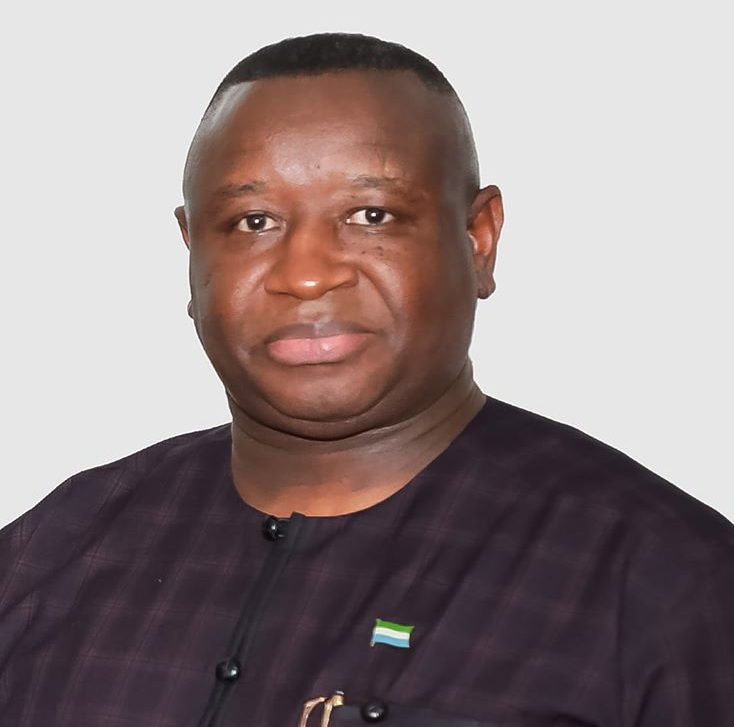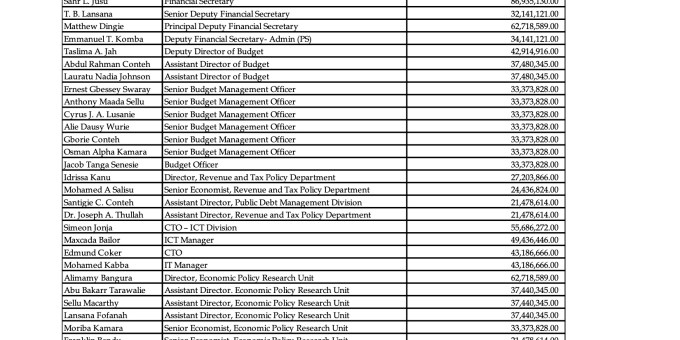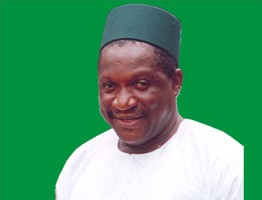
Payroll Corruption in Sierra Leone: The Ministry of Finance’s Scandalous Wage Bill
 By Chernoh Alpha M. Bah, Matthew Anderson, and Mark Feldman
By Chernoh Alpha M. Bah, Matthew Anderson, and Mark Feldman
Two weeks ago, the Sierra Leone media was inundated with news reports indicative of an already existing financial crisis facing the government of Sierra Leone. These news reports followed revelations of the government’s inability to pay monthly salaries to many public sector workers for the month of January 2020.
Indeed, on assuming office, the Bio administration launched multiple audits into the past activities of the Koroma regime, designed to examine issues of political and financial corruption, nepotism, and the largescale economic graft that permeated governance in the ten years that the APC was in power. A press release from the country’s Ministry of Finance issued on February 13, 2020, blames the recent salary payment delay on huge domestic and external debt overhangs inherited from the previous government of Ernest Bai Koroma. Finance Ministry officials say the total debt burden inherited from the Koroma regime amounted to the tune of US$2.59 billion in April 2018 when Julius Maada Bio assumed power.
A governance transition committee setup on April 6, 2018, just two days after Bio was sworn into office, reported, among other things, that the Koroma administration led Sierra Leone to the brink of economic collapse with a huge external and domestic debt burden driven mostly by an “exploded payroll – salaries and other compensation for government employees – that amounted to the tune of US$263 million or 14.4% of the GDP.” The report also stated that Koroma’s inability to close the fiscal gap and adhere to agreed actions under the IMF’s Extended Credit Facility had led to a suspension of both budgetary and balance of payment support to the country by 2017.
“The national currency became moribund, trading at Le7,600 to a dollar…inflation as at March 2018 was 17.2%… [and] overall, economic growth plummeted from 6% in 2016 to 3.7% in 2017,” the report alleged.
On assuming office, however, Maada Bio initiated what he called a “peaceful democratic war on corruption”, setting up three Commissions of Inquiry to interrogate past officials of the Koroma regime with the mandate to produce recommendations for cabinet action. The multiple audits accused officials of the Koroma regime of corruption related offenses and issues of unexplained wealth. Over the last two years, the country’s anti-corruption commission has reportedly recovered stolen public funds from members of the previous administration through several plea bargains and payment plans.

When he campaigned for the presidency in 2018, Maada Bio promised to rid Sierra Leone of public corruption and financial indiscipline, and to also increase accountability in governance. Two years later, citizens are questioning whether Bio has lived up to his electoral promises to increase government transparency and accountability.
Indeed, early enthusiasm has given way to frustration and disappointment. Upon taking power, the president’s office unprecedently began publishing lists of all who traveled as part Maada Bio’s international delegations, a promising sign given past abuse of international travel as an expensive means of rewarding loyalty. However, this practice was suddenly abandoned during Bio’s first official visit to China. Questions on the size and justification of foreign delegations have proliferated while Maada Bio has become the country’s most frequently traveling president, drawing criticism from activists and watchdog organizations concerned about ballooning travel costs in the midst of a budgetary crisis.
The declining state of the economy, particularly the collapse of the country’s national currency against the United States dollar and other foreign currencies, has heightened concerns of the government’s inability to address pressing questions of economic stability and national progress. This, in addition to rising political tensions between ruling party officials and opposition activists, have undermined any attempt to portray the country as stable and conducive destination for business investment. In recent months, Bio’s government has been in loggerheads with multinational mining corporations over concession agreements and royalty payments, with the disputes now before international tribunals for arbitration. A recent disastrous ruling against the government in favor of one of the mining companies threatens to undermine a major source of national income.

Given the continued urgency of the country’s economic crisis, Africanist Press has spent the last six months investigating and tracking public expenditure of the Sierra Leone government across key sectors of the economy, with the aim of assessing the fiscal position of Sierra Leone two years into Maada Bio’s regime. A major economic and ethical concern of government watchdog groups and civil society members has been the salaries of Bio’s appointees. Our investigation aimed to find out whether public policy pronouncements of the Bio government reflected actual national development reality on the ground. We asked, given Bio’s promises to limit government spending and waste, whether public expenditure and graft have reduced since Bio assumed power.
Thus, a primary goal of our investigation has been to assess what Bio has done, if anything, to address the scandalous disparities in the national salary structure. We aimed to find out whether he has actually addressed the “exploded payroll” he reportedly inherited from the Koroma regime. Secondly, we wanted to find out what economic and monetary policies have been put in place to arrest growing inflation, continued national currency decline, and the exploding balance of payment deficit.
In the course of this investigation, the Africanist Press has obtained official documents relating to financial transactions of the Bio government over the last two years. The evidence we have collected includes documents on the pay structure of the public sector workforce, documents relating to financial disbursements to government agencies and departments, expenditure relating to international and domestic travels of the president, the lists of the president’s delegations on all overseas travel in the last two years, funding received by the First Lady for the “Hands Off My Girls Campaign”, expenditure relating to national cleaning exercises, documents of contracts relating to supplies for free education materials, data of all timber exports from 2018-2019, and documents relating to mining investment negotiations and arrangements.
Civil servants we have spoken to as part of the investigation complain that while political appointees in the service receive huge pay checks, government has repeatedly ignored their calls for a harmonization of public salaries, a problem that has grown worse with the recent political appointments into the national workforce. Public sector workers we interviewed during our investigation all spoke about their enduring demands for increased wages and improved conditions of service, pleas that Maada Bio and his predecessors have largely ignored.

Our investigation reveals that the existing disparities in the national salary structure and the payroll have widened since Maada Bio assumed power two years ago, and that there has equally been a corresponding increase in the wage bill over the last two years, owing to a drastically enlarged pool of political appointees across all sectors of the civil and public service. Quite shockingly, most political appointees in these new categories are placed in positions where they earn monthly salaries that are, in most cases, between a 50 – 100% the total combined annual salaries of ten or twenty of the subordinate and ancillary staff in their respective departments. In the Office of the Financial Secretary, for example, we discovered that of the seven listed staff, the Financial Secretary and Senior Financial Secretary both earn monthly wages, the combined total of which is five times more than the aggregate annual gross pay of all five-ancillary staff in their department for a ten year pay period. The Financial Secretary Sahr L Jusu, for instance, receives a monthly pay of Le86,935,130, whilst all support staff under him earn between 552,000 to 1,420,079, with the exception of the Senior Deputy Financial Secretary who receives a monthly salary of Le32,141,121.

We also discovered that these gross salary disparities are evident across all departments and agencies where political appointees are placed over the regular civil and public service workers. Most employees of the civil service workforce in the Finance Ministry, in particular, earn between a salary scale of Le609,411 to Le1,905,253. Workers in these pay categories range from drivers and office assistants, to confidential secretaries, administrative staff, senior economists, and budget officers and experts. Confidential Secretaries in the Finance Ministry, for example, receive monthly salaries of Le802,607 while some senior economists receive Le1,420,079 in departments led by political appointees who are being paid anywhere from Le21,478,614 to Le86,935,130 each month. The combined total monthly pays of a sample list of thirty of the most highly paid senior staff of the Finance Ministry – including the financial secretary, deputy director of budget, principal deputy financial secretary, and director of the economic policy research unit – amounted to a monthly wage bill of Le1,100,481,905. When juxtaposed against the salaries of their subordinate staff in various departments across the Finance Ministry, the pay of political appointees is more than ten times the combined gross annual pays of at least 100 staff currently on the payroll of the Finance Ministry.
Thus, in this first installment of our series on Bio’s first two years in office, we find that there has been no government action to harmonize the appalling payroll disparities in the wage structure of public workers across all sectors of the civil and public service. Instead, the wage disparities have increasingly widened with the overflowing appointment of leading SLPP party loyalists into the civil and public service workforce over the last two years. The astronomical salary payments schemes developed for political appointees and recently promoted senior officials in ministries, departments, and agencies across have resulted in an expanded payroll with explosive increases in the wage bill to a whopping Le235.2 billion, an almost 45% increase in the last two years, from less than Le170 billion when Koroma left power.

While the expanded wage bill has increased the financial burden of government, a major public expenditure burden has equally been occasioned by the aforementioned numerous international travels by public officials, especially those associated with presidential delegations during and after Maada Bio’s state visit to China and his first trip to the UN General Assembly in 2018. Subsequent editions of this investigative series will focus and highlight the financial burden caused by these international travels.
It is obvious that the gross disparities and income inequalities between most political appointees and the ordinary civil service workers – especially those in the military, the police, and the teaching service professions – are part of the structural problems that must first be addressed if Maada Bio’s government is serious about tackling rampant public graft in all sectors of the country. While there has been a lot of talk about the fight against corruption since Bio assumed power, we discovered that the SLPP administration, by swelling the public payroll with such glaring inequalities as those within the public and civil service workforce, has nurtured a graft inducing environment across all public offices in the country.

The structural arrangements that produce different kinds of public graft and different kinds of corrupting behaviors in state institutions are yet to be dealt with by the current administration. Dealing with these structural problems would require addressing, first and foremost, how people are recruited or appointed into the public or civil service workforce, the imbalance scale of salary payments, the gross disparities in public employment conditions, the lack of employment protection for non-partisan members of the public and civil service, and the lack of regard for professionals in national service. These are the actual incubators to institutionalized state corruption that have to be sincerely addressed. In dealing with these problems, governments are required not to approach questions of national development with partisan considerations in mind, especially considering the fact that the partisanization of employment benefits does not enhance the success of any crucial sectoral development program, let alone its sustainability.
To make any meaningful progress, the Bio administration must give up its current logic of partisan governance and equally depoliticize its approach to national development. Failing this, Bio and his government will be unable to enact the national mobilization that is necessary for tackling the cancerous social conditions and governance culture that militate against development.
We have published above excerpts of acquired payroll documents to illustrate the national salary disparities summarized in this report.





